|
|
 |
|
Calanoida ( Order ) |
|
|
|
Diaptomoidea ( Superfamily ) |
|
|
|
Acartiidae ( Family ) |
|
|
|
Acartia ( Genus ) |
|
|
|
Odontacartia ( Sub-Genus ) |
|
|
| |
Acartia (Odontacartia) japonica Mori, 1940 (F,M) | |
| | | | | | | Ref.: | | | Mori, 1940 (p.328, figs.F,M); 1942 (p., figs.F,M); Ueda, 1986 a (p.12, Redescr., figs.F,M, Rem.); Chihara & Murano, 1997 (p.672, Pl. 21, 22: F,M); Barthélémy, 1999 (p.858, 865, figs.F); 1999 a (p.9, Fig.27, C-D); Ohtsuka & al., 2015 (p.123, Table 2). Srinui & al., 2019 (p.90, Rem. F,M); Lee S. & al., 2019 (p.86, Table 3). | 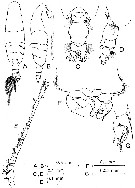 issued from : H. Ueda in Bull. Plankton Soc. Japan, 1986, 33 (1). [p.14, Fig.2]. Male (from Uchiura Bay, Japan): A, B, habitus (dorsal and lateral, respectively); C, D, posterior metasome and urosome (dorsal and lateral, respectively); E, right A1 (dorsal view); F, P5 (anterior view); G, 3rd segment of left P5.
|
 issued from : H. Ueda in Bull. Plankton Soc. Japan, 1986, 33 (1). [p.18, Table 1, A-G]. Comparative list of spines on the 1st to 4th segments of the A1 female of Steuer's Acartia erythraea Group.
|
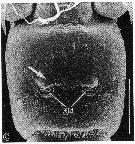 issued from : R.-M. Bathélémy in J. Mar. Biol. Ass. U.K., 1999, 79. [p.865, Fig.8, C]. Scanning electon miccrograph. Female (from Wasaka Bay, Japan): C, genital double-somite (ventral). Scale bar: 0.050 mm. Symbols: large arrow = anterior padsmall arrow = opercular pad; gs = genital slit.
|
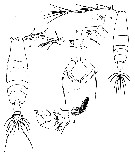 issued from : T. Mori in Zool. Mag. Tokyo, 1940, 52 (8).). [Figs.1-5]. Female (from Palao Is.): 1, P5; 3, habitus (dorsal); 5, forehead (ventral). Male: 2, P5; 4, habitus (dorsal).
|
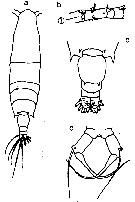 Issued from : M. Chihara & M. Murano in An Illustrated Guide to Marine Plankton in Japan, 1997. [p.679, Pl. 21, fig.14 a-d]. Female: a, habitus (dorsal); b, A1 (proximal segments); c, last thoracic segment and urosome (dorsal); d, P5. Nota: numbers show characteristics of this species to compare with A. erythrea, A. bispinosa, A. pacifica.
|
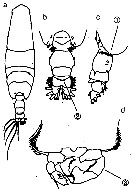 Issued from : M. Chihara & M. Murano in An Illustrated Guide to Marine Plankton in Japan, 1997. [p.680, Pl. 22, fig.14 a-d]. Male: a, habitus (dorsal); b, last thoracic segment and urosome (dorsal); c, same (lateral); d, P5. Nota: numbers show characteristics of this species to compare with A. erythrea, A. bispinosa, A. pacifica.
|
 Erratum: read Srinui and not Siruani. Female: 1 - Genital double-somite having paired posterodorsal processes. 2 - 2nd segment of A1 without strong curved processes. 3 - Exopod of P5 not thickened proximally. 4 - Caudal ramus longer than wide by at most ca 2 times; 2nd free urosomite with small spinules dorsally and posteriorly. 5 - 5th to 7th segments of A1, each lacking hook posteriorlt; genital double-somite with pair of small processes dorsally. 6 - 1st segment of A1 with single strong process distally. 7 - Caudal ramus with 4-6 rows of minute spinules dorsally. Male: 1 - Urosomite 3 without spine-like processes dorsally. 2 - Urosomite 4 with prominence dorsally; number of prominences on urosomite 4 more than 12. 3 - Terminal elements of left P5 as 3 small prominence.
|
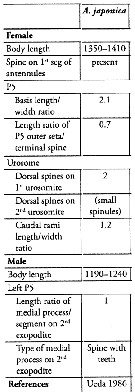 Issued from : S. Lee, H.Y. Soh & W. Lee in ZooKeys, 2019, 893. [p.84, Table 3]. Acartia (Odontacartia) japonica: Morphological characters. Compare with other Odontacartia species. Nota: 1 - Presence of spine on 1st and 2nd segments of female A1 ............. 2. 2 - Strong spines on dorsal surface of female genital double-somite .... 3. 3 - Small spinule row present on dorsal surface of female 2nd urosomite.
| | | | | Compl. Ref.: | | | Ueda & al., 1983 (p.165, Table 1, 2, 4, swarms); Ohtsuka & al., 2008 p.115, Table 5). | | | | NZ: | 2 | | |
|
Distribution map of Acartia (Odontacartia) japonica by geographical zones
|
| | | | | | | Loc: | | | Japan (Katae Bay: Simane Peninsula facing Japan Sea, Wakasa Bay, Okinawa) | | | | N: | 5 | | | | Lg.: | | | (182) F: 1,41-1,35; M: 1,24-1,19; (764) F: ± 1,65; M: ± 1,32; (866) F: 1,3-1,6; M: 1,2-1,3; {F: 1,30-1,65; M: 1,19-1,30} | | | | Rem.: | no synonym to Acartia amboinensis.
According to Ueda (1986, p.18) the close morphological similarity between A. australis and suggests that they may have undergone speciation recently. The author gives different explanations of the possible disjunction.
After Ueda & al., 1983 (p.167, Table 2 & p.169: Table 4) at Uchiura Bay (Japan): (1)-Shape and diameter of swarm, (2)-depth (m), (3)- swarming position, (4)-number of samples examined, (5)-Mean % of adults (range), (6)- Mean % of females among adults (range).
(1)- irregular balls (10-50 cm); (2)- 0.5-2 m; (3)- above algal beds; (4)- 5; (5)- 96.2 (79.4-98.6); (6)- 97.4 (97.0-99.0). | | | Last update : 09/03/2020 | |
|
|
 Any use of this site for a publication will be mentioned with the following reference : Any use of this site for a publication will be mentioned with the following reference :
Razouls C., Desreumaux N., Kouwenberg J. and de Bovée F., 2005-2026. - Biodiversity of Marine Planktonic Copepods (morphology, geographical distribution and biological data). Sorbonne University, CNRS. Available at http://copepodes.obs-banyuls.fr/en [Accessed March 03, 2026] © copyright 2005-2026 Sorbonne University, CNRS
|
|
 |
 |









